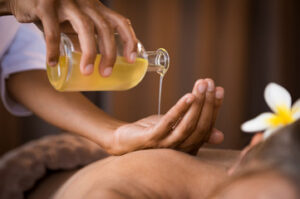Tulsa Massage oftens go hand in hand with a resort or a fancy hotel and for good reason: they ooze relaxation. This popular treatment also boosts mood and reduces anxiety.

Studies suggest that massage may help improve sleep. This is due to the effect it has on regulating the parasympathetic nervous system, which leads to more restful and better quality sleep.
Many people view massages as a luxury treatment that they indulge in only when on vacation or as a treat for themselves, but research shows that it can have many beneficial health effects. The most obvious benefit is the reduction of stress. Stress is a major contributor to mental and physical health problems and can lead to a wide range of illnesses, including heart disease, high blood pressure, anxiety and depression.
One of the ways in which massage decreases stress is by releasing hormones that help to calm the nervous system. These hormones also increase the feeling of relaxation and reduce feelings of anxiety. In addition, massage increases the body’s circulation and improves the flexibility of joints and muscles, which helps relieve tension.
It can also help improve the functioning of the immune system. Studies have shown that massage can help increase white blood cells and lymph flow, which boosts the body’s ability to fight off infections. This is especially important for individuals with chronic diseases, such as cancer.
When the body is stressed, it tightens up involuntarily, resulting in tense and painful muscles. This can lead to a cycle of stress, pain and tension that can be hard to break. Massage encourages the parasympathetic nervous system to take over and relaxes the muscles, reducing pain and tension.
Massage can help alleviate pain caused by injury, too. When an area is injured, the muscles surrounding the affected area will tighten up to protect it, which can cause further injury and discomfort. Massage reduces tension in the muscles and soft tissues, increasing movement and allowing the injured area to heal.
For people who suffer from a variety of ailments, including depression, anxiety and headaches, massage can be very beneficial. However, before receiving a massage, it’s important to check with your doctor to make sure it is safe for you. People who have certain medical conditions, such as high blood pressure or a history of stroke, should not receive massage. Also, pregnant women should not receive massages. In addition, if you have a medical condition, it’s best to let your massage therapist know beforehand so they can adapt their techniques.
Relaxes Muscles
One of the major reasons why massage feels so good is that it relaxes your muscles. This is because the rubbing and pressure of massage manipulates your soft tissue, increasing circulation to the area. The increased blood flow carries oxygen and nutrients to your cells, which speeds up the healing process and relieves tension.
Another way that massage relaxes your muscles is by releasing feel-good hormones like serotonin and dopamine. These hormones signal your brain that everything is alright and give you a sense of euphoria and well-being. This feeling of euphoria can even last after your massage, and may help you deal with stress and anxiety.
A study done by the University of Illinois found that massage decreases your heart rate, blood pressure, and levels of cortisol, a stress hormone. It also increases the number of white blood cells, which helps fight off infections and diseases. This is due to the fact that massage reduces inflammation in your body and promotes the healing of injured tissues.
Tight muscles increase stress and pain both physically and mentally, and they restrict movement, making it difficult to move freely. When these tight muscles are massaged, they increase in flexibility and movement, which decreases the amount of pain you experience, allowing you to relax physically and mentally.
Massage also helps to break down the scar tissue that builds up in your muscles when you injure them. The scar tissue grows in a cross hatch pattern that impedes muscle fibers’ normal alignment and movement. When you get a deep tissue massage, the kneading and pressure of this type of massage can help realign these muscle fibers, which can lead to increased mobility as well as a decrease in tightness and pain.
The muscle fibers in your legs tend to go stiff after a strenuous workout, which is when you start to feel the burn. Research shows that massage can help your muscles recover faster from the lactic acid build up that causes muscle soreness by removing the toxins from your body and increasing oxygen to your cells. This increased oxygenation will also help your muscle fibres absorb more energy, which can lead to improved muscle growth and recovery.
Reduces Anxiety
The soothing touch of massage reduces anxiety by triggering the body to release feel-good hormones, which naturally calm the body’s fight-or-flight response. This reaction is important for our survival but, when it is continuously activated, it can lead to stress, anxiety and a host of other health problems.
The physiological effects of a one-hour massage include lowering cortisol levels and increasing serotonin (a hormone neurotransmitter that reduces depression, elevates mood and carries signals between nerves). In addition, the relaxation of muscles caused by massage lowers heart rate and blood pressure, further reducing feelings of stress and anxiety.
A study done on emergency nurses who received massages showed that their stress and anxiety were significantly lower than before the massages. This is due to the fact that massages stimulate the release of endorphins, which calm the body’s peripheral nervous system and allows messages of relaxation and calmness to be relayed to the brain.
Another way that massage helps reduce stress is through the release of positive hormones that promote a sense of well-being and self-worth. When you are feeling better about yourself, it is easier to cope with stressful situations and it can also help prevent the onset of chronic stress.
The reduction of tension and anxiety also promotes a better night’s sleep. Studies show that people who receive regular therapeutic massages have improved sleeping patterns and are able to sleep deeper than those who do not get regular massages. The deep, soothing nature of the massage also flushes toxins from the body and increases energy that is necessary for good health.
The calming effects of a massage can also be used to help ease the symptoms of anxiety disorders, such as agoraphobia. Many people who suffer from agoraphobia are so afraid of having a panic attack in public that they are unable to live their lives to the fullest. By triggering the release of feel-good hormones and relaxing tense muscles, massage can reduce anxiety and allow patients to live life to the fullest. The calming effects of massage can also be used in combination with cognitive therapy to treat chronic anxiety and improve quality of life.
Improves Sleep
Sleep is essential to good health and can be difficult to achieve due to a variety of factors. Thankfully, massage therapy can help improve your sleep by relieving stress and tension in the body as well as promoting relaxation. Incorporating massage into a regular bedtime routine can also promote a better quality of sleep.
Research shows that massage increases the production of serotonin in the brain, which then leads to a natural increase in melatonin – a hormone that regulates sleep-wake cycles and helps us fall asleep at night. Other studies indicate that massage may also lower cortisol levels, a stress hormone, and can even help to improve insomnia.
One study conducted by researchers at the University of Texas Health Science Center found that people who received massage experienced a reduction in symptoms of insomnia including increased time spent sleeping and decreased waking during the night. This was because the body produced more melatonin, which led to reduced anxiety and a better ability to fall asleep.
Aside from boosting the body’s natural sleep hormones, massage also fosters mental relaxation and a sense of tranquility. This allows the mind to let go of worries and anxieties and rest easy knowing that everything is taken care of. Those who struggle with a chronic condition such as depression or anxiety are likely to benefit the most from massage, which can help alleviate their symptoms and ease the impact on their sleep.
When it comes to incorporating massage into your sleep routine, the key is consistency. Make sure to schedule a massage at least 2-3 times per week in order to reap the full benefits. If you don’t have the budget to hire a massage therapist, try some self-massage techniques at home before going to bed, such as massaging your temples, neck, shoulders, and soles of your feet.
For the most optimal results, it’s important to include a combination of techniques in your sleep routine, such as meditation or gentle stretching. By easing tension and stress, promoting relaxation, and balancing your sleep hormones, massage can provide a more peaceful and restorative slumber to help you get the best rest possible so that you can be your most productive.
